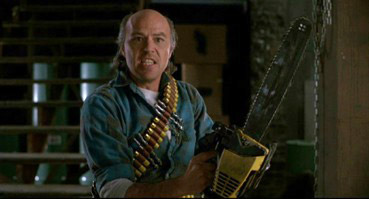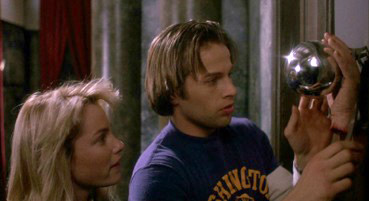Note:
This review does assume you have seen Phantasm
– if you haven't, then it's not a bad idea to do so before proceeding, as there are serious spoilers for that film ahead and discussion on characters and plot points established there.
It's
easy to knock a director for making a sequel to an original
work instead of creating something new. I've certainly
done it, but even as I did so I knew I was expressing a
desire for what might have been rather than appreciating
the practicalities of the film world. I've had direct experience
of the difficulties of funding a film project, one
that ended up being repeatedly compromised to satisfy the uncreative souls who were putting up the cash. I am thus well aware that getting one
film funded doesn't mean that the financial floodgates
will suddenly open. If you've made something as off-the-wall
as Phantasm,
even cult success does not guarantee money for future projects.
Hollywood may take note and quietly acknowledge the attention
that the film is getting, but the conservative nature of the studio
system means that even a sympathetic executive is unlikely
to offer its director a wad of cash to make something completely
new. No sir, they want to hedge their bets, and in the case
of a successful cult film that means only one thing – a sequel. To
director Don Coscarelli's credit, he resisted the temptation for a good
few years, but filmmakers also have bills to pay and they'd always prefer do so by making more movies. And if a sequel to
your own, treasured work is going to be made, who better to do
it than you, especially if you have a half-decent budget
to work with? And you know what, you might even do it for
the sheer joy of working with people you like and respect,
and to revisit characters you have become rather fond of.
Don
Coscarelli's low budget 1979 Phantasm was
a true original, a generic one-off that draws a fairly solid
line under the fate of at least two of its main characters.
Simply recycling the strangeness would prove a fruitless
exercise, especially given that much of it was explained
(well, sort of) in the first film's later stages. Add to this the nine years that have elapsed since the original, resulting in a previously juvenile lead who is now in his mid-20s, and you have a challenge on your hands.
With this in mind, the first surprise here is that Coscarelli chooses to begin his sequel at the very moment the first film concludes. To do so requires a
small cheat, with the transportation to Hell that was suggested by the first film's memorable ending scaled down to a little more than a sharp pull into
a wardrobe. This allows his good friend Reggie to tackle a whole gang
of murderous dwarfs (here given nasty faces by an increase in the budget),
bash one of them senseless, rescue the unconscious Mike,
and blow up the house. It's a breathless opening
sequence that signals a tonal shift from surrealistic horror to
a more action-driven genre work, the upped pace matched by the increased
invulnerability of the leads, who throw
themselves headfirst through an upstairs window and escape without a bruise, a cut, or a twisted ankle.

We then
hop forward and the older Michael is ready to
be released from the asylum in which he has spent the past
few years (nine, I'd guess) shaking off all those delusions
about a Tall Man, a gateway to an alien world, and a murderous
flying silver sphere. Or at least that's what his doctors have been misled believe. The moment that is Mike is released, he's in the local graveyard unearthing
coffins and finding evidence of extensive grave-robbing, then he and the still loyal Reggie break into a hardware store and tool up for the
hunt to follow. It seems appropriate that it's Reggie who
constructs the most memorable weapon, a four-barrel shotgun that you
just know is going to play a key role later in the film
(though quite why Reggie throws it away immediately afterwards
has always bemused me, and presents an early continuity issue
for Phantasm III).
It's
here that we get our first indication of what prompted Coscarelli's
change of approach, as the scene irresistibly recalls modern
horror's most famous tooling-up scene in Evil Dead
2.* The comparison extends to the increased emphasis
on pace and action and the sometimes kinetic camerawork, although there's some seriously smart work here, with an early floating shot used to represent viewpoint of escaping gas – seriously, how many times have you seen
that in a movie? Coscarelli even directly borrows from a scene in Raimi's
film, as the fleeing Mike runs through a series of doorways,
hotly pursued by both the camera and a sphere that blasts
each of the doors off their hinges. It
turns out that Raimi was something of a Phantasm
fan and was prepping Darkman as Coscarelli
was filming this sequel. He even begged him for a cameo appearance
– he gets one, sort of, when his name appears on a baggie
that crematorium ashes are poured into.
The
bigger budget allows Coscarelli to expand on the first film
in many respects, including the suggestion that the Tall
Man's activities are not restricted to a single location
but are gradually laying waste to whole communities and
leaving ghost towns in their wake. Thus, Mike and Reggie
have to take to the road to hunt their prey, who is aware
of their pursuit and appears to be thoroughly enjoying the chase, and leaves horrible little surprises for them en route. That their
journey ends at another mausoleum is neither a surprise
nor a disappointment – familiar sights abound (and one favourite
line of dialogue), but are nonetheless transformed by budget
and scale. The iconic flying spheres in particular have
been moved to centre stage and considerably upgraded, and
yes, I did use the plural – there are three of them now,
able to launch themselves from a rather smart flip-open
box and armed with a variety of drills and whirring cutters,
whose aural accompaniment has been made even more unpleasant
with the addition of the sound of whining dental drills. We get
the inevitable head-hole blood draining, but in a successful
effort to top this, Coscarelli manages to deliver a sequence
that should go down in history of one of the most genuinely
horrible committed to screen, as a sphere violently burrows
its way through a screaming funeral worker and….oh,
but you should see it.
Where
the new film treads on slightly shakier ground is its
introduction of young Liz and her long-standing telepathic
contact with Michael, not to mention the Tall Man's newly
acquired telekinetic powers, all part of the expansion process
but whose successful integration into the narrative will
depend very much on how much leeway you are prepared to
cut the film. They didn't really work for me, but I'm
sure plenty of fans are happy enough with them – certainly
the latter allows for the nicely executed (no pun) hanging
of the priest by his own upside-down crucifix-on-a-chain (itself
suggesting a satanic rather than alien connection), and the
delivery of a favourite line that was cut from the original.

More
successful is the introduction of a sex interest for Reggie,
in no small part thanks to Samantha Phillips' performance
as Alchemy, oozing confident but amused sensuality and turned
on most of all by Reggie's shiny dome – "God, Reggie,
I love your head!" she says lustily before riding
him like a bucking bronco and loudly yee-hawing. And yes,
I know she still has her panties on as she does so – just use your imagination.
Although
the leap forward in years allows for Mike's change from
12-year-old to young adult, it doesn't matter too much anyway
as here there has been a switch of actors, with James LeGros
(who had already dipped his toes in the genre as a near
victim of the bar massacre in Katherine Bigelow's Near
Dark) standing in for the unavailable Michael Baldwin
and doing rather well. As it happens, the whole cast is on good form
here, with even Scrimm walking a nice line between barnstorming
theatricality and genuine menace, and Reggie Banister really
getting comfortable with his role, proving that he is more than
just a cool horror dude.
Phantasm
II was never going to match the first film's originality
and other-worldly strangeness, and it recycles a couple too
many of that film's scenes and ideas for its own good, but
is otherwise a far better sequel than any of us had the right to expect, expanding on some aspects
and upping the pace in a way that gives it a distinct
identity of its own. It delivers on action, it delivers
on horror, and it's a coffin full of generic fun.
Some
film grain feels more prominet than it probably should, but otherwise this anamorphic 1.85:1
transfer is very nice indeed, with a good level of detail,
strong colour reproduction and contrast and bang-on black
levels, showcasing well Daryn Okada's lighting and Philip
Duffin's production design.
Of
the three soundtracks on offer, the stereo 2.0 is closest
to the original release but the DTS gives you the biggest
LFE bangs for your bucks, with explosions, music and even
the throaty engine noise on Reggie's Cuda rattling the windows.
The
Commentary from director Coscarelli
and actors Reggie Bannister and Angus Scrim is, unlike the
one found on the Phantasm
disk, newly recorded and is an engaging chat about the making
of the film and the critical response to it. Samantha Phillips,
who plays Alchemy, gets a fair amount of attention and there
are some fascinating revelations about the number of people
they have met at conventions who were inspired to become
embalmers or attend mortuary school by seeing the Phantasm
movies.
Fangoria
TV Spot starring Angus Scrimm (9:56) is an
amateur video taken at a Fangoria convention that wobbles
in an out of focus under the low convention lighting. Scrimm
plays to the gallery in what is almost a ventriloquist act
with his Tall Man impersonation, but the gallery loves him,
and he's often rather entertaining. If you want to know
which of the Tall Man's lines are fan favourites then look
no further. He is clearly a big fan of the classic Universal
horror films, and talks quite a bit about them.
US
TV Spots (1:22) features three TV spots from
the original release, each different enough from the other
to warrant inclusion.
Theatrical
trailer (1:19) is presented 4:3 and is rather
seductively assembled.
Photo
gallery consists of 19 stills, some looking
like frame grabs, some press photos and a couple featuring
publicity material.
Finally
there are Biographies for Don
Coscarelli, Reggie Bannister, Angus Scrim, Fred Myrow, James
LeGros and Kenneth Agar.
If
you're going to follow up a cult favourite then this is
a pretty good way to go, the shift in approach working well
(a similar up-the-action approach also worked for Aliens)
and the increased confidence and experience of both the actors
and crew pays stylistic dividends. The DVD delivers on
picture and sound and has a couple of enjoyable extras.
On it's own it'll do the job, but as part of the Sphere
Box Set it represents fine value.
*
Writer-director Roger Avery, who wrote a never filmed version of Phantasm 4,
apparently told Coscarelli that Phantasm II's
tooling up scene was the inspiration for Bruce Willis's
weapon selection sequence in Pulp Fiction, which he co-wrote with Quentin Tarantino.
|